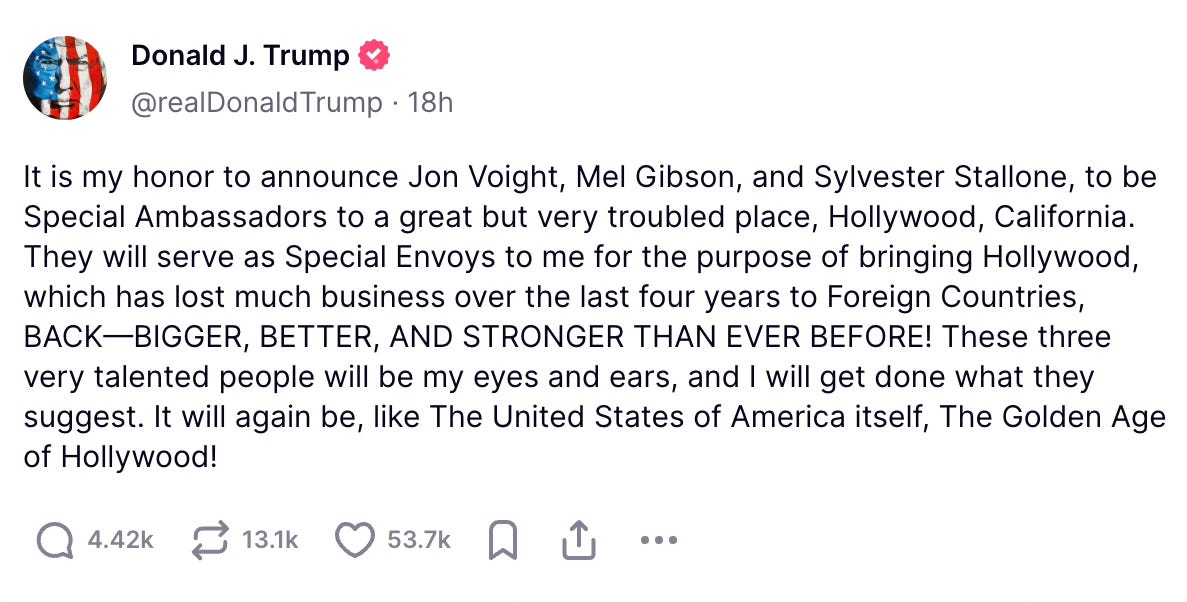Why we should take Trump seriously - but do nothing
ScreenPower: where TV and Film meet politics and power
Hello and welcome to ScreenPower.
There’s only one story in town this week in the screen sector…
So in today’s edition:
💥 What we know about the Trump film tariff threat
💥 Why you should take it seriously
💥 What we should do (and why calls to negotiate with the US are wrong).
➕
👊 Plus a landmark study has finally given us an idea of just how big the UK’s film and TV workforce is. I’ve got the key findings, and why it’s important.
Here goes… 📽️💪💥
🇺🇸 Why you should take Trump seriously and we should do about it 🎥
It’s 48 hours since President Donald J Trump announced his intention to put a tariff on films. Loads has been written about this already, but most of it is missing the point…
1. The problem Trump seems to have alighted on is a real one - for Californians at least
There’s been a tonne of speculation about what Trump meant by ‘a tariff on all movies’. The truth us, we simply can’t know for certain just yet - but we have a pretty good idea. His post sets out his complaint that ‘other countries are offering all sorts of incentives to draw our filmmakers and studios away from the United States’.
This isn’t new. For years now, the number of productions shooting in California has been declining. According to Film LA, the last five years have seen a 36% decrease in TV production and 28% decrease in film.
That’s because countries like the UK offer really attractive incentives for filmmakers: mainly, but not limited to, good headline tax rebates.
And so a debate has been going on in California for a while now about how to stop those productions going overseas. The Governor has proposed increasing the generosity of the tax credit available to filmmakers - but previous Governors have tried this before without much success.
Meanwhile the campaign group Stay In LA tried to appeal to the better nature of studios and streamers by asking them to pledge at least 10% more production in LA over the next 3-years.
So the issue Trump is highlighting is a real one - for American’s at least.
2. But a tariff on film is plainly not going to turn out well for the US
According to the MPA, the US film industry had a $15 billion trade surplus with the rest of the world in 2023.
And a film tariff war would hurt US companies as much as it would impact the UK, Canada etc. Just look at the shock that Apple and Netflix share prices took on Monday following Trump’s post:
3. And so it’s possible the conversation will ultimately end up at a federal tax incentive
As often seems to be the case with the President Trump, he starts with sticks rather than carrots. But an incentive is the only logical and effective solution to the problem he’s articulated.
He seems to have identified foreign countries as ‘the enemy’ - or at least, the party that needs to be forced to change its position. But really, there are only two parties in this dynamic: Hollywood and the US Government (and possibly the State of California). Surely over the next few days, the industry in CA will start a conversation with the US Government, where the bosses of the major studios and streamers start to set out what they would need to stop chasing incentives abroad.
Trump may be able to extract some (limited) success simply by highlighting the problem publicly - and perhaps prompting a small culture shift (i.e. shaming studios to do the ‘patriotic thing’ and shoot more at home). There was already talk about this when Trump first started talking about Hollywood back in January.
There have been calls from unions to introduce a federal tax incentive in the US for a while. IATSE (the International Alliance of Theatrical Stage Employees) said in November that a federal incentive was needed to “level the playing field” and that “legislation is needed urgently to save the cultural institution that is American film and television production.”
More importantly, we know that the plan that was brought to Trump by actor Jon Voight (below) was more carrot than stick. According to Fox News, it included “federal tax incentives, significant changes to tax codes, the establishment of co-production treated with foreign countries and infrastructure subsides for theatre owners, film and tv production companies and post production companies.” The proposal did apparently contain references to tariffs, but only “in certain limited circumstances”.
That said, it’s hard to imagine Trump wanting to be seen giving a massive tax break to Hollywood luvvie liberal types.
In summary, it’s hard to know whether Trump is serious about actual tariffs - or whether he’s using it as a way to highlight a problem and accelerate a solution. But either way, the direction of travel doesn’t look great for the UK. So while I think a calm approach is the best one…
…here are the two reasons you should take the Trump film threat seriously (in spirit if not in actuality):
1. We can’t afford not to
You can look at the UK’s film industry one of two ways: either it’s really dependent on production spending from US studios and streamers; or it’s actually just a ‘film service industry’ for California. Either way, US money is a significant factor in our film sector.
How big? Take a look at this chart based on stats from the BFI. The blue bar is UK film production funded from abroad, and the green bar is UK domestically-funded production. Our own ‘sector’ is dwarfed by the mighty dollar.
Of the total £2.1 billion spend on 191 film productions in the UK last year, inward investment (mostly from the US) contributed 87% of total film spend. Domestic UK films accounted for 9% of total film spend and co-production (between production companies from two or more countries) about 4%.
Furthermore, nearly two thirds was accounted for by productions from just eight companies: the five major US studios and the three major US steaming platforms (Netflix, Apple and Amazon). This is either amazing, or precarious, or both. It’s hard not to be nervous about a sector so highly exposed to flight risk that a single Presidential post can send shockwaves through it and put doubt into the minds of investors (which is what’s happening right now).
TBF one of the few politicians to have been sounding the alarm on this state of affairs has been Dame Caroline Dinenage, Chair of the Commons Culture, Media and Sport Committee, who’s been talking about our dependence on the US pretty much since she took the job two years ago. Her committee’s report last month warned against complacency and called for measures to mitigate the risks (you can read my summary in ‘A Bad Day for Streamers’ from last month).
2. We were all warned about this MONTHS ago
Trump has been consistent on this policy area since coming to power. NOBODY should be surprised by this announcement.
Way back in January - before his inauguration - Trump announced he wanted to make Hollywood ‘bigger better and stronger than ever before’ having ‘lost much business over the past four years to foreign countries’. He appointed three ‘ambassadors’ to help in the task: Mel Gibson, Sylvester Stallone, and Jon Voight.
I’m not saying I told you so, but ScreenPower readers will remember I wrote about it at the time (‘What could Trump’s Hollywood plan mean for the UK’) - and subsequently in four further editions, warning readers to keep an eye on noises from the White House.
Shortly after being appointed, Ambassador Gibson appeared on Fox News to articulate the problem of ‘runaway production’, explaining that it was cheaper for him to fly an entire crew to shoot in Europe for three days than to shoot for one day in LA.
So what should we do about it?
Two thoughts:
What should we do in relation to the US? NOTHING.
There are calls for the (UK) Government to lobby the White House, and to prioritise this issue in trade talks.
We should do nothing of the sort. This a domestic US problem, with a domestic US solution. The White House may not yet realise that - but it will soon be made clearer to them than perhaps Jon Voight was able to. It’s possible - possible - this plan wasn’t fully thought through before being exposed to public scrutiny, so the policy development may just have to be done under the public spotlight (which will be uncomfortable for everyone). We should sit it out - and let it play out within the US.
Besides, what would we actually do as the UK - offer to lower our tax incentives? Promise to host fewer productions here?
The one thing we could potentially do is keep the prospect of a streamer levy on the table - but I see our Culture Secretary has now firmly ruled that out (although the Sunday Times reports that the whole of DCMS could be scrapped anyway, so maybe we all just go home).
It’s also possible Trump is also only doing this for leverage in trade talks, as a (free) bargaining chip. We’ll beg to be spared - and he’ll spare us because it doesn’t work anyway - and we’ll have trade that in exchange for some unfortunate cottage industry. Don’t fall for it!
What should we do in relation to our own domestic film production sector? EVERYTHING.
Whatever the doubts, the bluster, the uncertainty, there are several indicators pointing towards a situation where the US on-shores more production over the next few years, to the cost of the UK and other countries.
Therefore, the UK Government should do all it can to further stimulate and support domestic production here.
This is something Caroline Dinenage’s committee has called for this week: “the Government’s forthcoming Creative Industries Sector Plan needs to meet the challenge we set down of incentivising inward investment while also growing our domestic sector so British film and high-end TV can thrive”.
And outgoing Channel 4 CEO Alex Mahon told the Sunday Times’ William Turvill at the weekend (before the Trump announcement) that the UK’s production sector risks becoming a “service industry” for the US, adding: “We need things that are owned by British companies. Not to sound Trumpian about it, but we do require that for our industry to stay strong.”
And the Shadow Culture Secretary Stuart Andrew, has called on the Government to “take decisive action to strengthen and protect the UK film industry”.
So in summary, the 280 character version is this:
Stay calm, but take it seriously because Trump has landed on a genuine issue, he warned us about this already, and we can’t afford to ignore it.
Let it play out within the US, but in the meantime do everything we can to strengthen domestic production here.
📊 Landmark study into UK’s screen workforce
This is very timely…
A landmark study into the UK’s film and TV workforce was published last week by ScreenSkills and 4Skills (Channel 4’s skills arm), conducted by Ampere Analysis.
Give me numbers: Lack of data has been a real issue for the screen sector in recent years, so this report is hugely valuable, and provides the clearest picture yet of the size and shape of the screen workforce and the challenges it faces.
Historic: Ampere say it’s the most comprehensive piece of research ever conducted into UK film and television workforce dynamics.
Why is this important: Because lots is said about skills and the screen workforce, especially by politicians, but with not a lot of data to back it up. This report will help to ensure policy can be more focused on current industry needs.
Here are the key findings:
In 2024, the UK’s screen workforce was nearly 200,000 strong.
Previous estimates ranged a lot from 50k to 200k, so its good to have some certainty.
BUT the workforce is at just 60% of capacity.
This is due to cutbacks in projects and the trends we all know too well. Newer/entry-level crew are particularly disadvantaged by lack of work.
60% of workers are based outside of London.
But Greater London is unsurprisingly the largest single region.
72% of respondents have extra capacity for work.
And 65% of freelancers have found it hard find work in the past year.
Skills gaps are most common in mid-to-senior roles.
This is useful to focus politicians’ minds, since their focus (obsession?!) is normally with entry level jobs (the CMS Committee report claimed that ‘entire cohorts of sixth-form students could find jobs in the industry that fit their skills and interests’ - which isn’t quite borne out by the evidence).
The workforce has become more diverse but challenges persist – particularly in social mobility
The report found 31 per cent of the workforce comes from low or working-class backgrounds, compared to a national benchmark of 39% - highlighting a need to ‘identify and remove industry barriers’
This has long been a problem, and some Culture Secretaries have made it their focus. Clearly there’s work to do, but TBH that figure is less bad than I had thought.
This is a really welcome piece of work - but as the picture is changing rapidly (see story above re Trump!), more of this data will be needed - and more regularly - to ensure training and support can be directed where it is needed.
📺 What to watch…
My ‘what to watch’ this week is actually a ‘what to read’ - and it goes out to TV critic Scott Bryan and his excellent Substack ‘Worth Watching’:
Don’t waste evenings scrolling through channels to find something to watch - let Scott decide! Worth Watching is definitely worth reading 👌
🎞️ Recommend ScreenPower
Thank you for reading ScreenPower!
As ever, do get in touch with any comments or questions on the topics covered in this issue, either by replying to this email or by connecting on LinkedIn.
And if you know someone who might enjoy this - why not forward it to them? It’s free!














